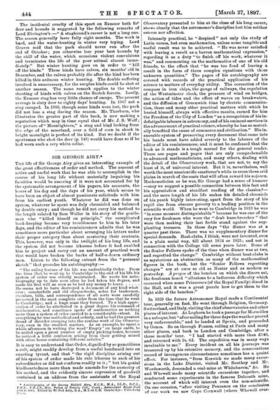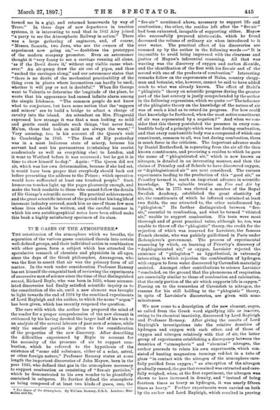SIR GEORGE AIRY.*
TEE life of Sir George Airy gives an interesting example of the great effectiveness of order and method.. The amount of active and useful work that he was able to accomplish in the
course of his long life without materially impairing his faculties would be amazing if it were not accounted for by the systematic arrangement of his papers, his accounts, the hours of his day and the days of his year, which seems to have been an object of almost passionate solicitude with him from his earliest youth. Whatever he did was done on system, whatever he spent was duly chronicled and balanced by double entry ; and though he did not carry his method to the length related by Sam Weller in his story of the gentle- man who "killed hisself on principle," the complicated book-keeping became very troublesome to him in his later days, and the editor of his reminiscences admits that he was sometimes more particular about arranging his letters under
their proper category than about mastering their contents. This, however, was only in the twilight of his long life, and
the system did not become irksome before it had enabled him to project and carry out an amount of practical work that would have broken the backs of half-a-dozen ordinary men. Listen to the following extract from the "personal sketch" that precedes his autobiography :—
" The ruling feature of his life was undoubtedly Order. From the time that he went up to Cambridge to the end of his life his system of order was strictly maintained. He wrote his auto- biography up to date soon after he had taken his degree, and made his first will as soon as he had any money to leave He seems not to have destroyed a document of any kind what- ever : counterfoils and old cheque-books, notes for tradesmen, circulars, bills, and correspondence of all sorts were carefully preserved in the most complete order from the time that he went to Cambridge; and a huge mass they formed. To a high appre- ciation of order he attributed in a great degree his command of mathematics, and sometimes spoke of mathematics as nothing more than a system of erder carried to a considerable extent. In everything he was methodical and orderly, and he had the greatest dread of disorder creeping into the routine work of the Observa- tory, even in the smallest matters. As an example, he spent a whole afternoon in writing the word 'Empty' on large cards, to be nailed upon a great number of empty packing-boxes, because he noticed a little confusion arising from their getting mixed with other boxes containing different articles."
It is easy to understand that Order, dignified by so punctilious a cult, might readily develop from a useful handmaid into an
exacting tyrant, and that "the rigid discipline arising out of his system of order made his rule irksome to such of his subordinates as did not conform readily to it ; " but his genial kindheartedness more than made amends for the austerity of his method, and the evidently sincere expression of goodwill contained in an address from the assistants of the Royal
• Autobiography of Si, Goons Biddoll Awij, Lap., M.A., LL.D., D.C.L., F.R.A.S., Hon. Follow of Trinity Coll., Camb • Astronomer Royal from 1•136 to 1981. Edited by Wilrid Airy, B.A., M.InstO.E. Oarabridge : University
Pr(-!. Observatory presented to him at the close of his long career, shows clearly that the astronomer's discipline lost him neither esteem nor affection.
Intensely practical, he " despised " not only the study of Latin verses, but even mathematics, unless some tangible and useful result was to be achieved. "He was never satisfied with leaving a result as a barren mathematical expression," regarding it as a duty "to finish off his work, whatever it was," and commenting on the mathematics of one of his old friends, to the effect that "he was too fond of leaving a result in the form of three complex equations with three
unknown quantities." The pages of his autobiography are covered with records of the practical application of his science to matters of everyday utility. The correction of the compass in iron ships, the gauge of railways, the regulation of the Westminster clock, the pressure of wind on bridges, the action of tides and the effect of waves on breakwaters, and the diffusion of Greenwich time by electric communica- tion, these and many other practical matters with which he busied himself, always with effective results, earned for him the Freedom of the City of London "as a recognition of his in- defatigable labours in astronomy, and of his eminent services in the advancement of practical science, whereby he has so materi- ally benefited the cause of commerce and civilisation." His in- exorable system of preserving every document that came into his hands must have added severely to the labours of the editor of his reminiscences; and it must be confessed that the book as it stands is a tough morsel for the general reader. There are pages and pages that are only comprehensible to advanced mathematicians, and many others, dealing with the detail of the Observatory work, that are not, to say the least of it, of universal interest. But it is, nevertheless, well worth the most unscientific smatterer's while to cross these arid plains in search of the oasis that will often reward his sojourn. Mathematician as he was, Sir George had a sense of humour —may we suggest a possible connection between this fact and his appreciation and steadfast reading of the classics?— and the mere length of his life makes his detailed chronicle of his youth highly interesting, apart from the story of his rapid rise from obscure poverty to a leading position in the scientific world. When he went to Cambridge in 1819 he was "in some measure distinguishable" because he was one of the very few freshmen who wore the "drab knee-breeches" that were then making their last feeble stand against the sup- planting trousers. In those days "the dinner was at a quarter past three. There was no supplementary dinner for special demands. Boat-clubs, I think, were not invented, even in a plain social way, till about 1824 or 1825; and not in connection with the College till some years later. Some of the Senior Fellows spoke of the time when dinner was at two, and regretted the change." Cambridge without boat-clubs is as mysterious an abstraction as many of the mathematical figures in the book, but the "Senior Fellows regretting changes" are at once as old as Nestor and as modern as yesterday. 2 propos of the benches on which the diners sat, the freshman heard "allusions to a ludicrous difficulty which occurred when some Princesses (of the Royal Family) dined in the Hall, and it was a great puzzle how to get them to the right side of the benches."
In 1829 the future Astronomer Royal made a Continental tour, generally on foot. He went through Belgium, Germany, Switzerland, and Italy, visiting the chief observatories and other places of interest. At Leghorn he took a passage for Marseilles in a xebeque, but "after sailing for three days the weather proved very unfavourable," and he landed at Spezia, and proceeded by Genoa. So on through France, calling at Paris and many other places, and back to London and Cambridge, after a three months' tour. "I had started with more than 2140, and returned with 2s. 6d. The expedition was in many ways invaluable to me." Every incident on all his journeys was treasured up by his retentive memory, and the conscientious record of incongruous circumstances sometimes has a quaint effect. For instance, "from Keswick we made many excur- sions in the Lake District, visited Mr. Southey and Mr. Wordsworth, descended a coal-mine at Whitehaven," do. He and Whewell made many scientific excursions together, and conducted some experiments in the famous Dolcoath mine, the account of which will interest even the non-scientific. On one occasion, "after visiting Penzance on the conclusion of our work we saw Cape Cornwall (where Whewell over-
turned me in a gig), and returned homewards by way of Truro." In these days of new departures in traction systems, it is interesting to read that in 1842 Airy joined "a party to see the Atmospheric Railway in action." There was a large gathering of engineers, and, of course, "Messrs. Samnda, two Jews, who are the owners of the experiment now going on," — doubtless the prototypes of the modern company promoter. Even an astronomer thought it "very funny to see a carriage running all alone, 'as if the Devil drove it,' without any visible cause what- ever." An air-pump drew the air out of pipes, and thus "sucked the carriages along," and our astronomer states that "there is no doubt of the mechanical practicability of the thing even in places where locomotives can hardly be used; whether it will pay or not is doubtful." When Sir George went to Valentia to determine the longitude of the place, he wrote that his appearance had caused infinite alarm among the simple Irishmen. "The common people do not know what to conjecture, but have some notion that the sappers and miners' are to build a bridge to admit a charge of cavalry into the island. An attendant on Mrs. Fitzgerald expressed how strange it was that a man looking so mild and gentle could meditate such things, 'but never fear, Ma'am, those that look so mild are always the worst,'" -Very amusing, too, is his account of the Queen's visit to Cambridge in 1843. "The Dean of Ely yesterday was in a most ludicrous state of misery, because his servant had sent his portmanteau (containing his scarlet academicals as well as everything else) to London, and it went to Watford before it was recovered ; but he got it in time to show himself to-day." Again : "The Queen did not sit, which was her own determination, because if she bad sat, it would have been proper that everybody should back out before presenting the address to the Prince ; which operation would have suffocated at least one hundred people." Such humorous touches light up the pages pleasantly enough, and make the book readable to those who cannot follow the details of Sir George's scientific career. His practical achievements, and the great scientific interest of the period that his long life of incessant industry covered, mark him as one of those few men whose lives should be written, and the careful manner in which his own autobiographical notes have been edited make this book a highly satisfactory specimen of its class.







































 Previous page
Previous page